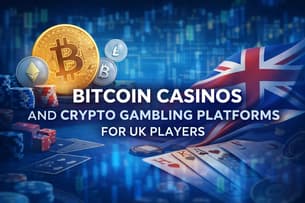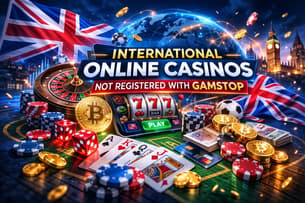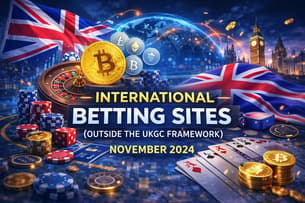Why Esports Gamers Are Captivated by Cryptocurrency

The recent collision of competitive gaming and blockchain is altering how players play, earn and invest. Find out the reason top esports athletes use cryptocurrency and how blockchain is altering gaming economies.
The cryptocurrency market has become a worldwide financial powerhouse dominated by Bitcoin. Ever since its 2009 launch, Bitcoin is now the most valuable cryptocurrency when it comes to market capitalization. But why are a lot of esports gamers, particularly top earners, drawn to cryptocurrency? The key is found where blockchain tech, player-owned economies, and the competitive gaming scene all come together.
Looking at Decentralized Finance
Bitcoin is a digital currency that is void of any central bank control. The bitcoin price today is around $97,652 and has a market cap of US $1.935 trillion. Its decentralized nature, its transparency and censorship resistance have made it a core of the digital economy. A network of computers verify transparent and safe transactions. Such a system eliminates intermediaries like banks and offers a worldwide financial solution. For many esports gamers that operate internationally, Bitcoin means they can send earnings over without paying huge fees or standing in line.
Bitcoin's value retention and growth potential make it an appealing investment. A few of the top esports players - who make large amounts from tournament fees and sponsorship fees - see Bitcoin as a hedge against their portfolios. With an established track record and growing adoption, Bitcoin is a hedge against established financial systems. Might that be why gamers flock to cryptocurrency?
Blockchain Gaming Takes Center Stage
Player-owned economies are a new idea of blockchain gaming. In conventional gaming, developers control the in-game assets themselves. Blockchain flips this model on its head by letting players own, trade and make money from digital assets. This has brought up blockchain gaming investments by 314% in Q2 2024, to $1.1 billion.
For competitive gamers, this model is particularly exciting. Skins, weapons and characters have real worth and could be turned into money. Players can sell things on decentralized marketplaces and also receive cryptocurrency in return. This ownership model encourages increased engagement because players are financially invested in what they do. Developers also benefit because they can concentrate on continual updates instead of new releases. Blockchain gaming is much more than a trend - it's a sustainable development of the market.
Competition Meets Financial Incentives
Competitive gaming requires skills and planning as well as high-pressure situations. One might study the game for hours, come up with strategies and try to climb up the leaderboards. What if those skills generated income too? It can happen with blockchain gaming.
And with cryptocurrency, competitive platforms let players earn cash by monetizing their skills. Tournaments can award crypto prizes and in-game assets can be bought and sold for real cash. There’s nothing quite like the thrill of a close play or even snagging that hard-earned win.
Esports Top Earners With Money to Invest
The richest esports players in 2025, like Johan "N0tail" Sundstein and Jesse "JerAx" Vainikka, have earned millions through sponsorships and tournaments. With these massive earnings, diversification is important. Cryptocurrency is a contemporary investment avenue which combines high growth potential with technological advancement.
For these players, Bitcoin in particular is appealing. It is decentralized in nature and in line with the values of gaming communities: autonomy and transparency. And because Bitcoin is a worldwide currency, it's a practical option for international earners. For top players, it is about much more than simply preserving wealth - it is about investing in cryptocurrency.
Opportunities in Blockchain Gaming
Despite its potential, blockchain gaming faces hurdles. Usability remains an issue, and conventional gamers are discouraged by the intricacy of wallet systems and coin mechanics. Another problem is scaling - the blockchain infrastructure has to have the ability to deal with large numbers of users at exactly the same speed and security as is possible.
But solutions are emerging. Developers are creating user-friendly interfaces and blockchain technology is improving scalability. Because these challenges are addressed, blockchain gaming is poised for mainstream adoption. The 2024 investment surge is a sign of confidence in the prospects of the country. For gamers, the ability to own, sell and profit off of in-game assets is just way too appealing to pass up.
More Crypto Trends in Esports
NFTs really are a game changer in esports/gaming. Unlike interchangeable cryptocurrencies like Bitcoin, for instance, NFTs are electronic assets that aren't interchangeable. This not only improves the gaming experience but creates a digital economy. Could NFTs be the next huge revenue stream of esports?
Community engagement is enhanced through the integration of NFTs. Exclusive digital assets help fans connect with their favorite players and teams. That sort of ownership drives loyalty and esport participation. The future of competitive gaming may well see more NFTs as blockchain technology improves.It's more than a passing trend: the esports-cryptocurrency mix. It's a paradigm shift in how players interact with games and also manage earnings. Bitcoin and its decentralized model in addition to blockchain's player owned economies are changing the face of gaming. For competitive gamers this convergence opens up unprecedented financial and personal investment possibilities. As the market keeps growing, one thing’s for sure: esports and cryptocurrencies are going to be connected down the line. Are you ready to be part of this change?

Elen Stelmakh is a creative individual dedicated to advancing gaming culture through articles and visual design. As a full-time EGamersWorld author and designer for a gaming website, Elen not only creates content but also infuses it with energy and creativity.
 Non-UK Online Casinos: Games, Formats, and What Players Can ExpectOnline casinos operating outside the UK gambling framework attract attention due to differences in licensing models, game portfolios, and promotional...
Non-UK Online Casinos: Games, Formats, and What Players Can ExpectOnline casinos operating outside the UK gambling framework attract attention due to differences in licensing models, game portfolios, and promotional... Bitcoin Casinos and Crypto Gambling Platforms for UK PlayersCrypto-based gambling platforms have become a noticeable segment of the global online casino market.
Bitcoin Casinos and Crypto Gambling Platforms for UK PlayersCrypto-based gambling platforms have become a noticeable segment of the global online casino market. Best International Online Casinos for UK PlayersThe online casino industry is an ever-rising sector acknowledged for its technology, extensive library of games, and the amount of revenue it generate...
Best International Online Casinos for UK PlayersThe online casino industry is an ever-rising sector acknowledged for its technology, extensive library of games, and the amount of revenue it generate... International Betting Sites for UK Players (Outside the UKGC Framework) — November 2024As a platform focused on reviewing international online betting sites, our goal is to provide structured and up-to-date information about operators th...
International Betting Sites for UK Players (Outside the UKGC Framework) — November 2024As a platform focused on reviewing international online betting sites, our goal is to provide structured and up-to-date information about operators th...


